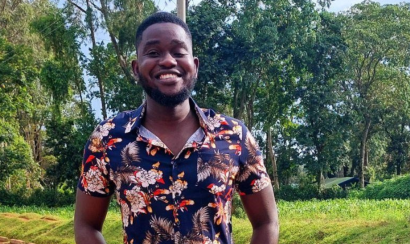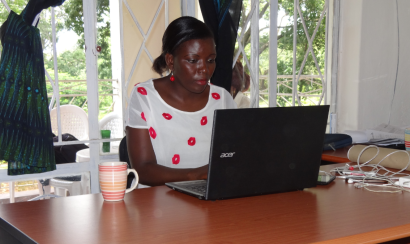In My Own Words: Nephat Maritim
Nephat Maritim, a Government Relations Senior Analyst, leads the team responsible for coordinating our work with the Government of Kenya. Besides overseeing regulatory compliance, he also lends his expertise to shaping public opinion on matters of food security and fiscal policy in agriculture. He talks about how One Acre Fund is collaborating with the Government to serve farmers during the coronavirus crisis, his career, and where he draws inspiration for his work.

Nephat (left) pictured with the area Member of Parliament, Titus Khamala, during a tour of the One Acre Fund headquarters in Kakamega.
What role has the Government Relations team been playing in our ongoing response to the Covid-19 pandemic?
Locally, we’re focused on keeping One Acre Fund and the Government of Kenya aligned on the best way to serve farmers during this time. We’ve signed agreements with county governments in the areas we work —23 in total—and are working closely with the county emergency response teams and other players in the food value chain to ensure farmers can continue to grow the food we so badly need. We are working round the clock to deliver as much useful information, protection, and sanitation as possible to keep everyone in this critical sector safe. We’re also providing vital linkages with the government’s locust containment efforts. While the Ministry of Agriculture is coordinating the aerial spraying of swarms, we’re working with local communities to identify and act on hoppers before they begin to swarm.
How has Covid-19 changed the way you work, and how we are collaborating with the Government?
It helps that the country enjoys wide mobile network coverage, complemented by high rates of mobile phone ownership across the country, as well as a tech-savvy government. As a team, we’ve always been set up to work remotely because we have staff across our offices in Kakamega, Nyanza, Central Kenya, and Nairobi. This means that we switched to remote operations even more seamlessly than anticipated.

Lillian Avugwi and John Ombogo, (left), One Acre Fund Government Relations team members, and the Busia County Executive for Agriculture, Dr. Moses Osia, pose after signing an MoU.
There are many ways to get involved in development. Why agriculture?
I believe that food security is key to economic development in Kenya, as it is for many parts of Africa. The history of development around the world has always had food security at the core of the economic development agenda. Food is also a basic need. I think that the greatest challenge, for our age and perhaps for the next century, will be how to feed ourselves sufficiently.
Why did you choose to work with One Acre Fund?
From the onset, the fact that One Acre Fund was committed to the professional development of all its staff appealed to me. I liked that there was an array of programs and support structures to encourage professional growth, including leadership and management training programs, professional development stipends, career spot-coaching, and structured, regular check-ins between managers and direct reports.
You clearly have a passion for this. What gets you out of bed in the morning?
It's nice to know that the work I do has a direct impact on people's lives. And I’m talking about people that I care about—my grandmother and mother are my clients! Actually, I hope that One Acre Fund will cater for tea farmers as well, and supply them with farm inputs like fertilizer for tea because that's what we farm in Kericho, where I'm from. People say that the earth is the perfect distance from the sun, but to my people, Kericho is the perfect distance from the sun!
But yes, it's what keeps me going, and I'd like to invest myself in solving these kinds of problems in my community.
When you first started working here, how did you explain to your mom what you do?
I told my mum that I am one of over 3,000 people who make sure that she gets her seed and fertilizer delivered to within walking distance of her home, and to other rural parts of the countries we serve.
Good answer. What do you get up to outside of work?
I don't have any sort of secret talents, but I like reading, running, and hiking. I'm usually doing one of those three things at any time I'm not working. Oh, and eating, so that’s four things! I like to think I am a foodie, or was one in another life.
What does impact look like to you?
Impact for me is when farmers have money in their pockets. When farmers can afford nutritious, satisfying, and sufficient amounts of food, and when they can generate income to go into education and healthcare for their families—that is impact!
In December 2019, we hit the one millionth farmer milestone. How does it make you feel, knowing that you’re working at this kind of scale?
It’s exciting, naturally, but it's also challenging. We have demonstrated that it’s possible to develop a model that is easily adaptable across different contexts. The challenge lies in the fact that the one million farmers we now serve make up just a tiny fraction of all smallholder farmers in the world. Even with reference to the countries we serve, it's still a small fraction. There's still a lot of work to do.

Members of our millionth farmer group pose with their field officer, Cyrus Onundu, in Kisii, Kenya
What do you find to be most unique about our culture?
What I think sets us apart is that we’re a large organization that works primarily in rural areas, yet we still succeed in cultivating an innovative and entrepreneurial feel to our operations. We send out hundreds of 10-ton trucks to villages scattered across hundreds upon hundreds of square kilometers in Kenya alone. The quality farm supplies we distribute are eventually delivered to within walking distance of each farm. At the same time, we have field officers walking around with tablets, providing personalized care to each farmer we serve. We’re a large organization that makes itself feel pretty small.
Speaking of size, what has it been like for you working in a global, multicultural organization?
I’ve come to realize that we have a very deep sense of mission and humanity because I come across people with very different backgrounds who really connect with me because we’re all working towards the same goal – empowering smallholder farmers. There's something powerful about that. I've met a former air force pilot, an engineer, an architect, a restaurant waiter, a lawyer, et cetera, all working together to accomplish the same mission.
What has been your biggest—hopefully pleasant—surprise at One Acre Fund?
That has got to be the level of responsibility and accountability that people generally hold themselves to. If you compare one job at One Acre Fund to a corresponding one at a different organization, you will likely find that people exercise a little more responsibility here than elsewhere.



